PH jab cards turn up in yellow, red, green but no standard form
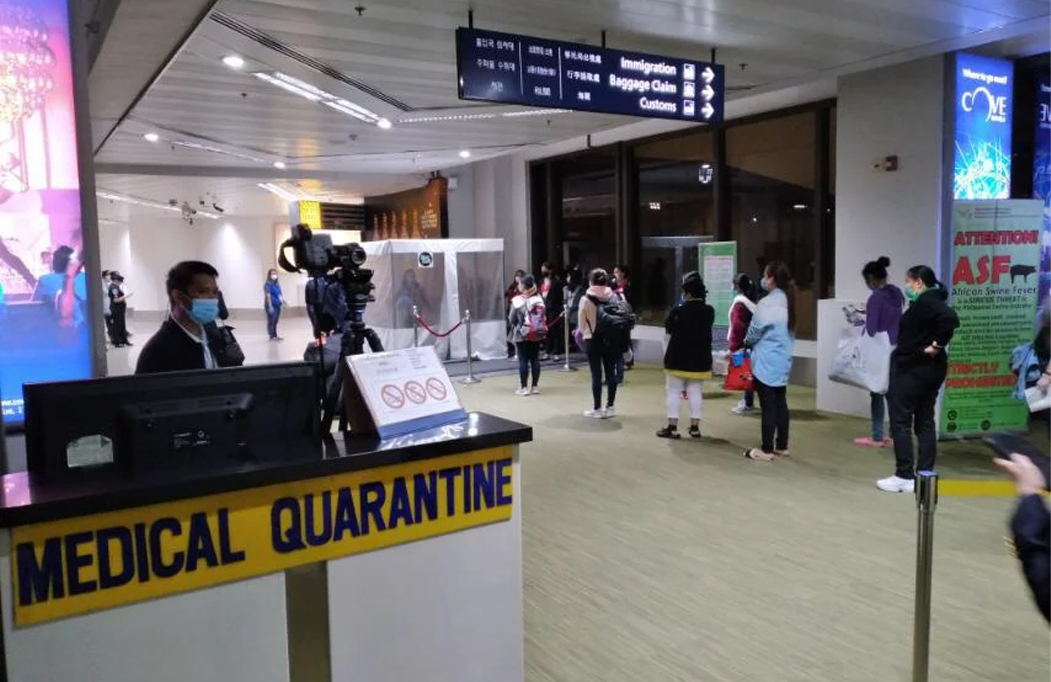
AIRPORT SCENE. Travelers line up for tests at a Philippine airport. FILE PHOTO
MANILA, Philippines—One local government’s vaccine card, serving as proof of vaccination, looked like an index card with green edges. Another had red edges. Yet another was colored orange.
For purposes of showing proof of vaccination in the Philippines, these could suffice. But for Filipinos traveling abroad, the local government vaccine cards are just that—cards.
What happened?
On Aug. 10, Foreign Affairs Secretary Teodoro Locsin Jr. announced that vaccination cards issued by different local government units (LGUs) will not be honored by Hong Kong authorities because these did not come from a single source.
According to Locsin, Hong Kong was demanding a standardized form of vaccine passport to ensure authenticity.
This prompted the Department of Foreign Affairs (DFA) to ask the National Vaccination Operations Center (NVOC) and Bureau of Quarantine (BOQ) to issue so-called yellow cards, or international certificate of vaccination or prophylaxis (ICVP).
It is a document created by the World Health Organization (WHO) to serve as certification of full vaccination against COVID.
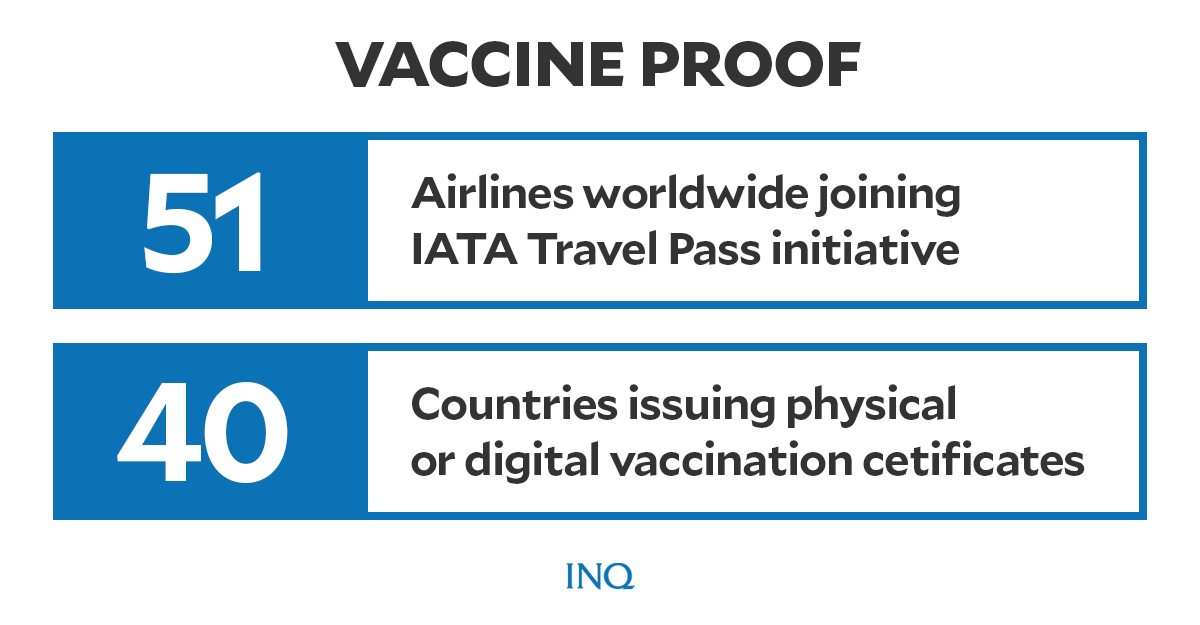
Graphic by Ed Lustan
The DFA and LGUs are also working on a single database to be monitored and managed by the Department of Information and Communications (DICT) which could also help in adopting a unified vaccination card or certificate for Filipinos.
On Monday (Aug. 23), Labor Secretary Silvestre Bello III said Hong Kong will soon allow the entry of fully vaccinated Filipino workers who will present certificates issued by BOQ.
READ: Vaccinated Hong Kong-bound OFWs to be allowed entry starting Aug. 30
Various looks, content
Having different vaccination cards issued by different LGUs in Metro Manila highlighted the problem of not having a standardized certificate of vaccination.
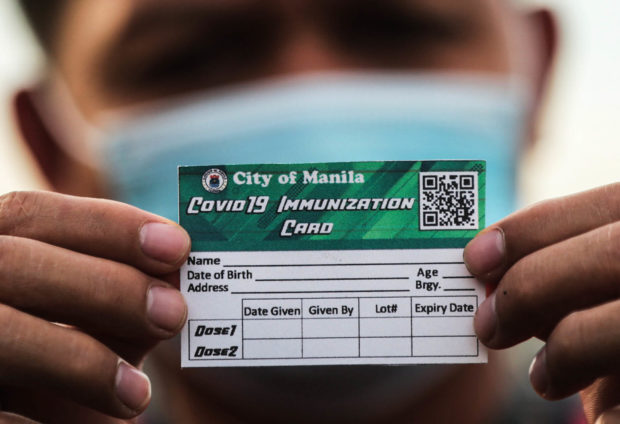
VACCINE card being issued in Manila City. FILE PHOTO
But how different are the vaccine cards anyway?
All versions include basic information about the vaccine recipient, the manufacturer and brand of the vaccine administered, the date of vaccination, where it was administered and identities of health professionals who administered the vaccines.
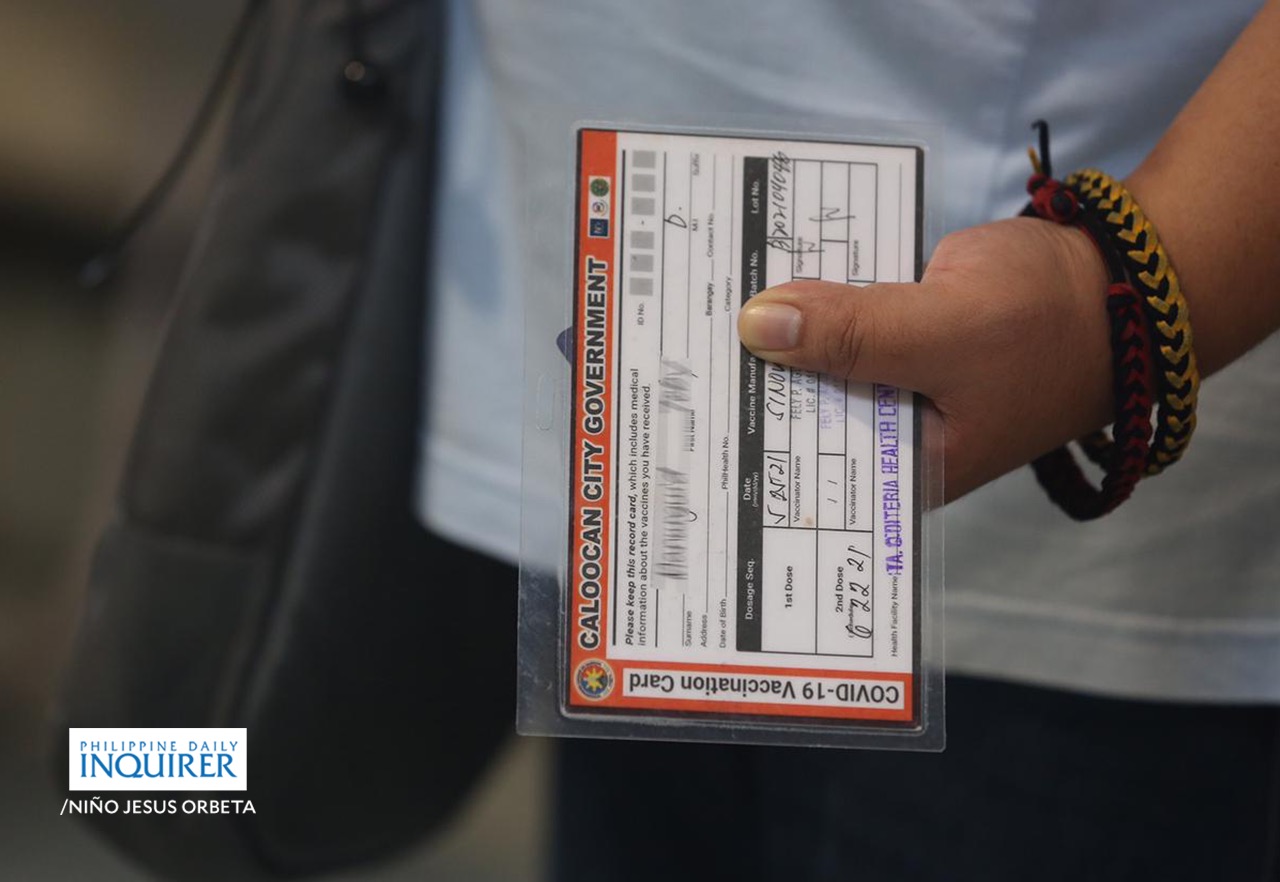
A passenger at MRT-3 shows a vaccine card issued by Caloocan City. FILE PHOTO
But some vaccine cards from LGUs required additional details.
In Parañaque City, for example, a vaccine information passport (VIP) is issued as certification. But this required not only details about the vaccine but also the jab recipient’s health history or whether the recipient has other ailments like flu, pneumonia, measles, mumps and rubella, HPV, tetanus, hepatitis, varicella and others that required vaccination.
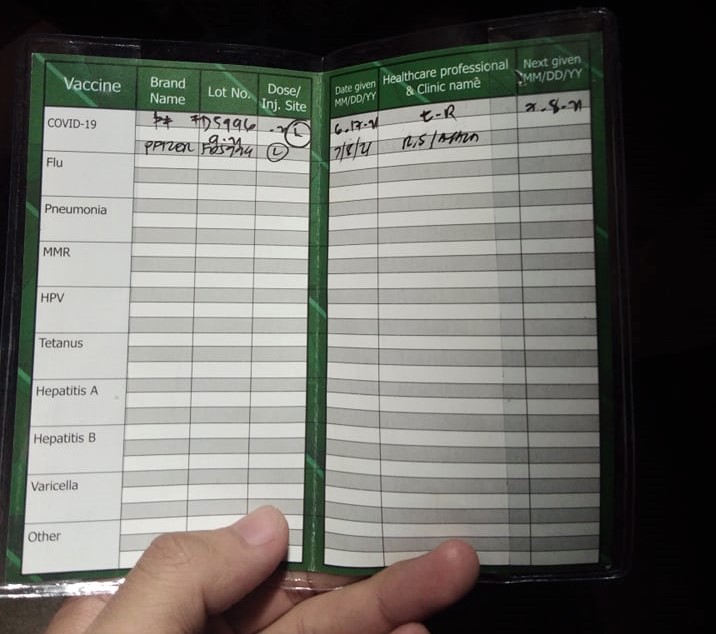
SPACES TO FILL. Vaccine card issued by the Paranaque City government contains spaces for information other than about COVID-19. Photo courtesy of Facebook user and Parañaque resident Jan Sebastian Eroles.
Local government-issued vaccine cards, or passports, also come in different sizes and colors. Some are about the same size as passports while others are bigger.
The ‘yellow card’
An NVOC advisory on applying for a yellow card at the BOQ was issued last month but was made public only recently amid the refusal of Hong Kong to acknowledge vaccine cards from different Philippine LGUs.
According to yo the advisory, outbound travelers who have been fully vaccinated in the Philippines may apply for a yellow card in case the destination country required such proof of vaccination.
Those who want to get yellow cards should sign up on the BOQ’s website to get a schedule, wait for their schedules and proceed to the BOQ office indicated in their confirmed schedule. Cards issued by local governments have to be presented. Each yellow card costs P370.
The NVOC, however, noted that the advisory was just an interim guideline which could change when a unified vaccine database was already completed.
While the BOQ planned to open more satellite offices to cater to more outbound travelers and issue more yellow cards, BOQ Deputy Director Roberto Salvador Jr. explained that not all countries required yellow cards.
READ: BOQ to open more branches to issue vaccination ‘yellow cards’
“The yellow cards are not required of all international travelers. Before departure, coordinate with your destination or airline to know the requirements before entering a certain country,” he said.
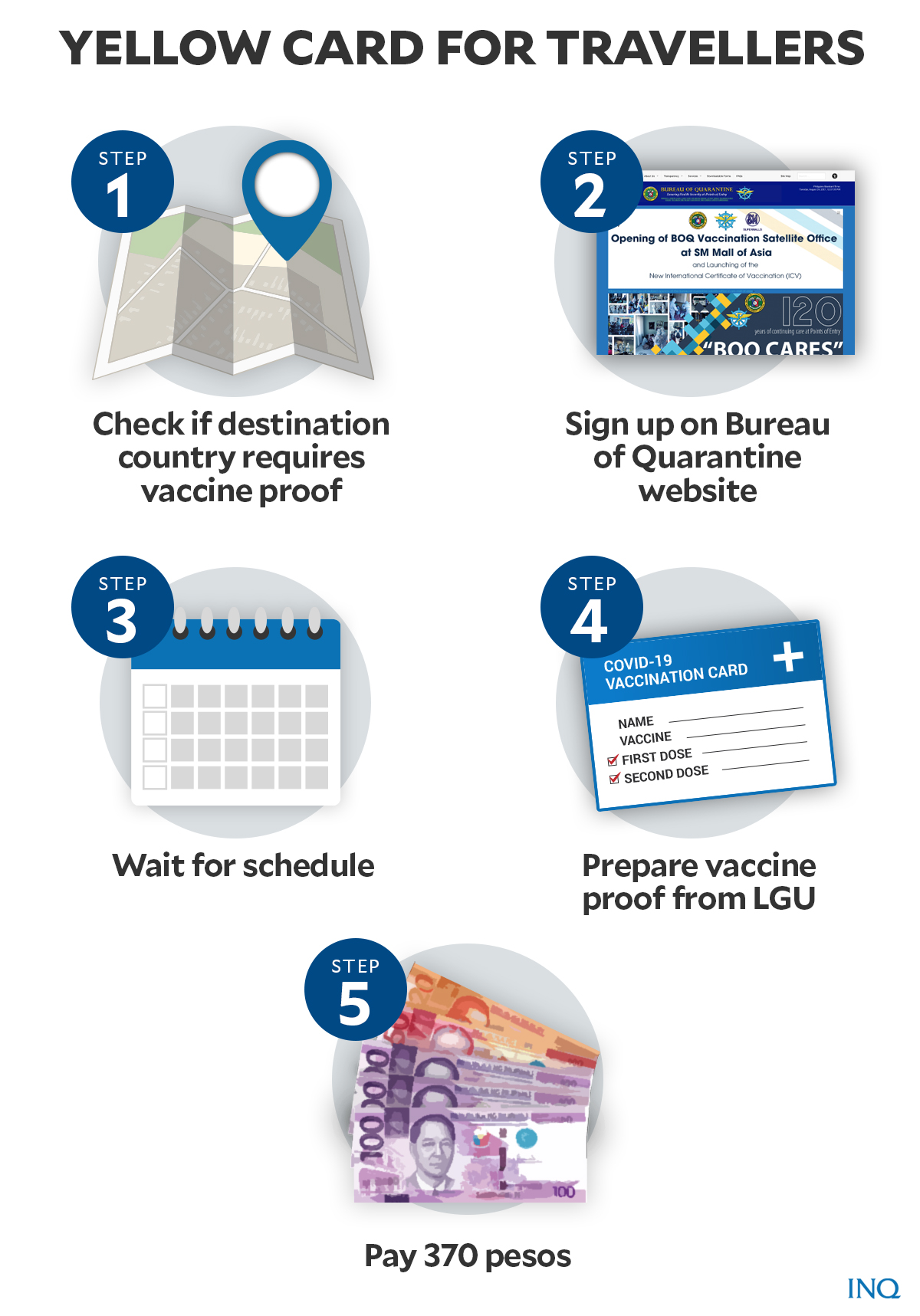
Graphic by Ed Lustan
To avoid superspreader events at BOQ offices, Salvador said only travelers headed to countries that require vaccination proof would need yellow cards.
The general public is also not yet advised to apply for the yellow card.
“For now, we don’t encourage them to get a yellow card if they will not travel out of the country,” the deputy director said.
“Those who will go abroad who really need to get their yellow cards may lose their slots,” he added.
The ‘IATA Travel Pass’
Aside from the yellow card, the Philippines, through the Philippine Airlines (PAL), has previously joined a global initiative to adopt a common digital vaccination passport for travelers.
Last April, PAL announced its participation in a global trial for the International Air Transport Association’s (IATA) COVID-19 digital passport
The trial period for the IATA Travel Pass mobile app, according to the airline, ran from May to June for flights from Manila to Los Angeles and Singapore.
READ: Philippine Airlines joins global trial for COVID-19 digital passport
“IATA Travel Pass is a mobile app that helps travelers to store and manage their verified certifications for COVID-19 tests or vaccines,” said IATA on its website.
“It is more secure and efficient than current paper processes used to manage health requirements (the International Certificate of Vaccination or Prophylaxis, for example),” IATA said.
“This is important given the potentially enormous scale of testing or vaccine verifications that will need to be securely managed,” it added.
The digital pass provides:
“Governments with the means to verify the authenticity of tests or vaccinations and the identity of those presenting their certificates.”
“Airlines with the ability to provide accurate information to their passengers on test requirements and verify that a passenger meets the requirements for travel.”
“Laboratories with the means to issue certificates to passengers that will be recognized by governments.”
“Travelers with accurate information on test requirements, where they can get tested or vaccinated, and the means to securely convey the results/certificates to airlines and border authorities.”
So far, 51 airlines worldwide have joined the initiative. The most recent ones were airline companies from India, Vietnam, Taiwan, and China.
What others do
Over 40 countries across the globe have already started issuing physical or digital vaccination certificates for their residents, according to data by US-based company Move Hub.
Among those countries that use digital or mobile app-based vaccine certificates were China through WeChat,Japan via CommonPass app, Italy, which uses an online portal to claim a digital “green pass” and Saudi Arabia which launched an online immunity passport service through Tawakkalna app.
Those who received COVID-19 vaccine jabs in Italy and other European Union (EU) member states will be issued an EU Digital COVID-19 passport or certificate.
However, unlike these countries that adopted a unified vaccine passport, the United States—similar to the Philippines—also issued different certificates per state.
In an article published by The New York Times, White House press secretary Jen Psaki last March said that the federal government is “not now nor will be supporting a system that requires Americans to carry a credential.”
She added that “there will be no federal vaccinations database and no federal mandate requiring everyone to obtain a single vaccination credential.”
New York was the first state to offer a digital COVID-19 vaccine passport, which also includes information such as COVID test results, through multinational technology company International Business Machines (IBM) Corporation.
The digital vaccine pass—called Excelsior Pass—is issued by the state using health data from the state and New York City’s vaccine databases.
Other states have either banned the use of digital vaccine passes, while some leave it as a personal choice by the vaccine recipient and not mandatory.
TSB
For more news about the novel coronavirus click here.
What you need to know about Coronavirus.
For more information on COVID-19, call the DOH Hotline: (02) 86517800 local 1149/1150.
The Inquirer Foundation supports our healthcare frontliners and is still accepting cash donations to be deposited at Banco de Oro (BDO) current account #007960018860 or donate through PayMaya using this link.